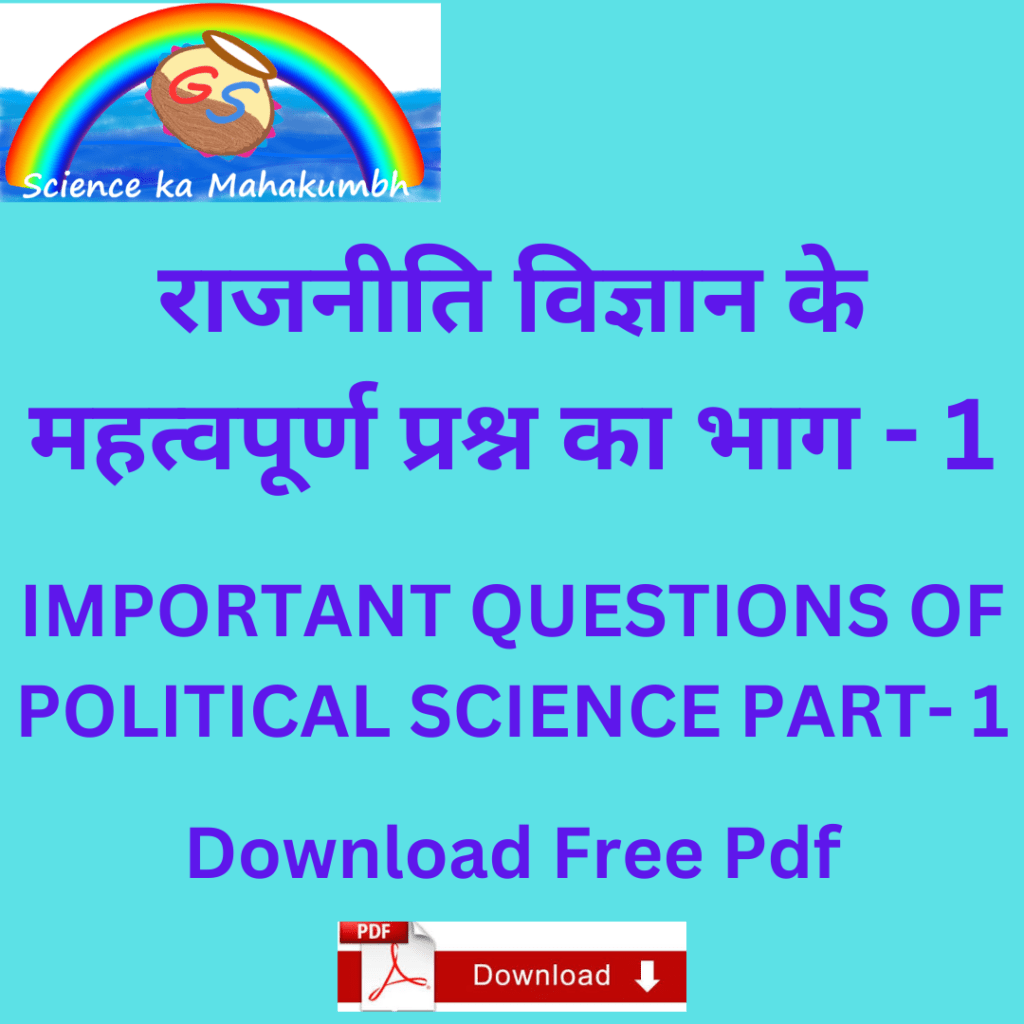हमारी वेबसाइट “Science ka Mahakumbh” में आपका स्वागत है। यह राजनीति विज्ञान के महत्वपूर्ण प्रश्न का भाग – 1 हैं जिसमें 30 महत्वपूर्ण प्रश्न हिंदी के साथ-साथ अंग्रेजी भाषा में भी दिए गए हैं। राजनीति विज्ञान नोट्स पीडीएफ
Welcome to our website “Science ka Mahakumbh”. This is Part – 1 of Important Questions of POLITICAL SCIENCE in which 30 important questions have been given in Hindi as well as in English language.
| TELEGRAM GROUP LINK 1 | CLICK HERE |
| FOLLOW US IN INSTAGRAM | CLICK HERE |
| TELEGRAM GROUP LINK 2 | CLICK HERE |

राजनीति विज्ञान के महत्वपूर्ण प्रश्न भाग – 1 IMPORTANT QUESTIONS OF POLITICAL SCIENCE PART- 1
Q. In which country the Fundamental Rights were first recognized – United States of America
मूल अधिकारों को सर्वप्रथम किस देश में मान्यता की दी गई- संयुक्त राज्य अमेरिका
Q. Who has the right to hear about Fundamental Rights- Supreme Court
मौलिक अधिकारों के बारे में सुनवाई करने का अधिकार किसको है- सर्वोच्च न्यायालय को
Q. In which article the right to freedom is described- Article-19-22
स्वतंत्रता का अधिकार अनुच्छेद में वर्णित है- अनुच्छेद-19-22
Q. What is mentioned in the Fundamental Rights in Article-24 – Rights of children against exploitation
अनुच्छेद-24 में मौलिक अधिकारों में क्या वर्णित है – बच्चों को शोषण के विरुद्ध अधिकार
Q. Which fundamental right is not available to foreign citizens – Right to freedom of expression
कौन-सा मूल अधिकार विदेशी नागरिकों को प्राप्त नहीं है – अभिव्यक्ति की स्वंतत्रता का अधिकार
Q. Where is the writ filed for the enforcement of Fundamental Rights – in the Supreme Court
मौलिक अधिकारों को लागू करने के लिए रिट दायर की जाती है – उच्चतम न्यायालय में
Q. Which writ is required to get a prisoner produced before the court – Habeas Corpus
किसी कैदी को न्यायालय के समक्ष प्रस्तुत करवाने के लिए रिट की आवश्यकता होती है – बंदी प्रत्यक्षीकरण
Q. In which right is the freedom of the press – freedom of speech
प्रेस की स्वतंत्रता किस अधिकार में निहित है – भाषण स्वतंत्रता
Q. In which article the Right to Information has been added – Article-19 (a)
सूचना का अधिकार किस अनुच्छेद में जोड़ा गया है – अनुच्छेद-19 (a)
Q. In which case the Parliament has been given the right to amend the Fundamental Rights – in Kesavananda Bharati case
किस वाद में संसद को मौलिक अधिकारों में संशोधन का अधिकार दिया गया है – केशवानंद भारती वाद में
Q. In which article the right to education has been added – Article 21 (a)
शिक्षा का अधिकार अनुच्छेद में जोड़ा गया है – अनुच्छेद-21 (a)
Q. In which article of the Indian Constitution is the abolition of untouchability – Article-17
भारतीय संविधान में अस्पृश्यता उन्मूलन अनुच्छेद में हैं – अनुच्छेद-17
Q. Who can suspend the fundamental rights – President
मौलिक अधिकारों का निलंबन कर सकता है – राष्ट्रपति
Q. Which petition literally means ‘We order’ – Mandate
किस याचिका का शाब्दिक अर्थ होता है ‘हम आदेश देते हैं’ – परमादेश
Q. B. R. Whom Ambedkar called the heart and soul of the Constitution – Right to constitutional remedies
बी. आर. अंबेडकर ने संविधान का ह्नदय एवं आत्मा की संज्ञा दी – संवैधानिक उपचारों का अधिकार
Q. Who has the right to impose restrictions on Fundamental Rights – Parliament
मूल अधिकारों पर प्रतिबंध लगाने का अधिकार किससे पास होता है – संसद के पास
Q. By which amendment the fundamental right to property was abolished – by the 44th amendment.
संपत्ति के मौलिक अधिकार को किस संशोधन द्वारा समाप्त किया गया – 44 वें संशोधन द्वारा।
Q. Which writ can be filed for personal liberty – Habeas Corpus
व्यक्तिगत स्वतंत्रता के लिए कौन-सी रिट दायर की जाती है – हेवियस कॉपर्स
Q. The chairman of the drafting committee of the constitution – Dr. Bhim Rao Ambedkar
संविधान के प्रारूप समिति के चेयरमैन कौन थे – डॉ. भीम रॉव अम्बेडकर
Q. What happens at the highest position in the three-tier Panchayati Raj system – Zilla Parishad
त्रि-स्तरीय पंचायती राज व्यवस्था में सर्वोच्च स्थान पर होता है – जिला परिषद
Q. The tenure of Rajya Sabha members is fixed by the – Parliament
राज्यसभा सदस्यों का कार्यकाल निर्धारित किया जाता है – संसद द्वारा
Q. Can a member of Rajya Sabha become a member of the Council of Ministers- Yes
क्या राज्यसभा का सदस्य मंत्रिपरिषद का सदस्य बन सकता है— हाँ
Q. Who was the first legal minister of independent India- Dr. B. R. Ambedkar
स्वतंत्र भारत के प्रथम कानूनी मंत्री कौन थे— डॉ. बी. आर. अंबेडकर
Q. At the time of appointment of which Prime Minister, he was not a member of any house- HD Deve Gowda
किस प्रधानमंत्री की नियुक्ति के समय वे किसी भी सदन का सदस्य नहीं थे— एच. डी. देवगौड़ा
Q. Who was the first Prime Minister of India – Jawaharlal Nehru
भारत के प्रथम प्रधानमंत्री कौन थे— जवाहर लाल नेहरू
Q. Which Prime Minister was the Prime Minister for the longest time – Jawaharlal Nehru
कौन-से प्रधानमंत्री सबसे अधिक समय तक प्रधानमंत्री रहे— जवाहर लाल नेहरू
Q. Who is the chairman of Planning Commission – Prime Minister
योजना अयोग का अध्यक्ष कौन होता है— प्रधानमंत्री
Q. Who is the chairman of the meeting of the federal cabinet- Prime Minister
संघीय मंत्रिमंडल की बैठक का सभापति कौन होता है— प्रधानमंत्री
Q. Who became the Prime Minister of India after Jawaharlal Nehru – Guljari Lal Nanda
जवाहरलाल नेहरू के बाद भारत के प्रधानमंत्री कौन बने— गुलजारी लाल नंदा
Q. Which motion can be moved by the Council of Ministers in Parliament – confidence motion
कौन-सा प्रस्ताव संसद में मंत्रिपरिषद रख सकती है— विश्वास प्रस्ताव
DOWNLOAD FREE PDF
Moreover, to read Part-2 of IMPORTANT QUESTIONS OF POLITICAL SCIENCE, keep visiting our website.
Furthermore, you can visit other subject pages for more questions.
